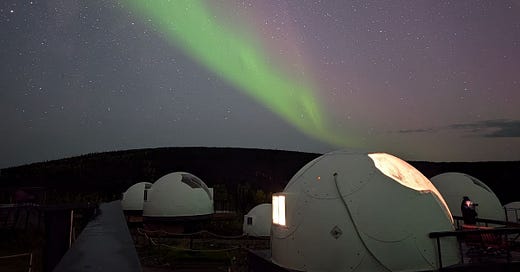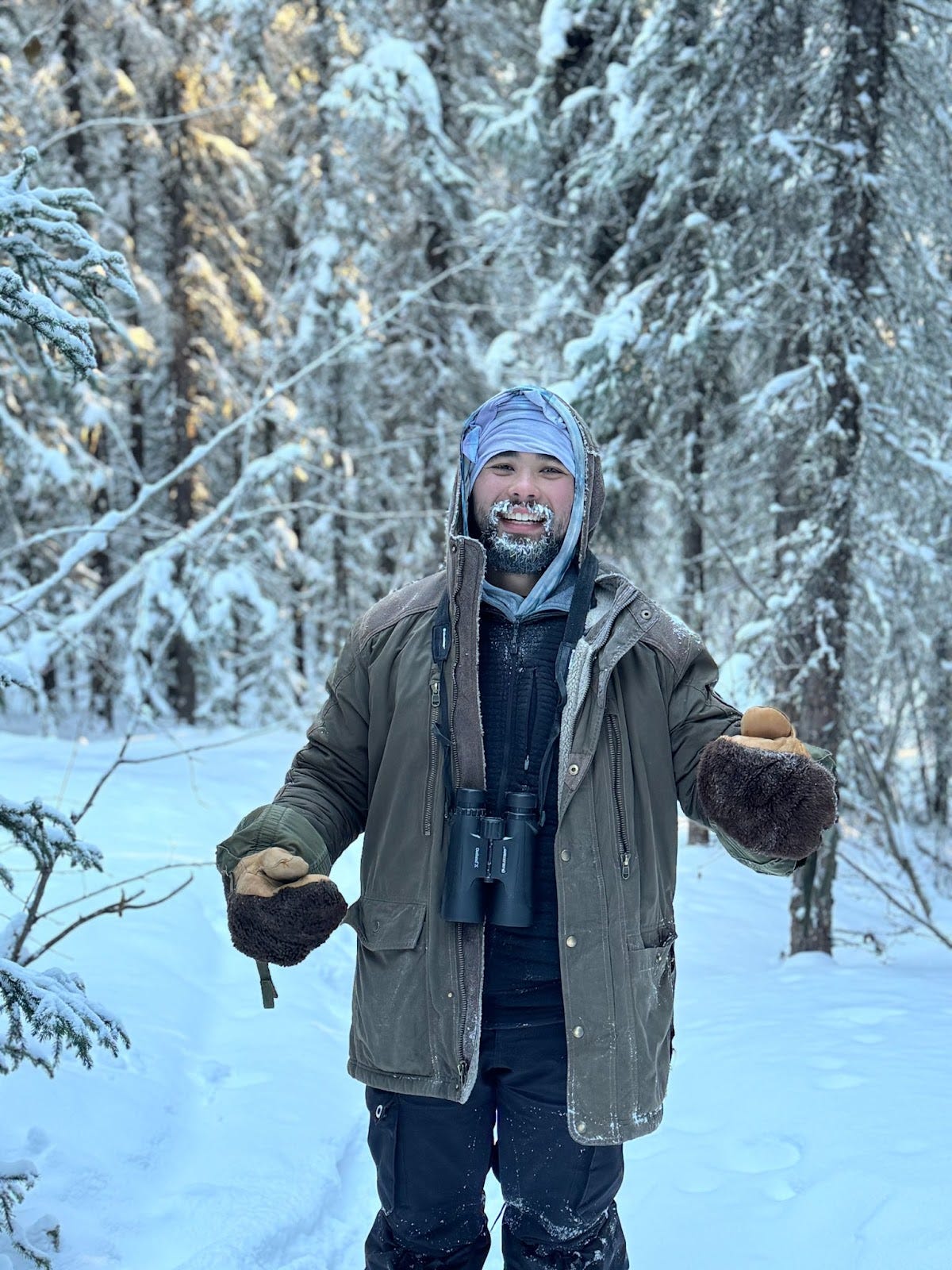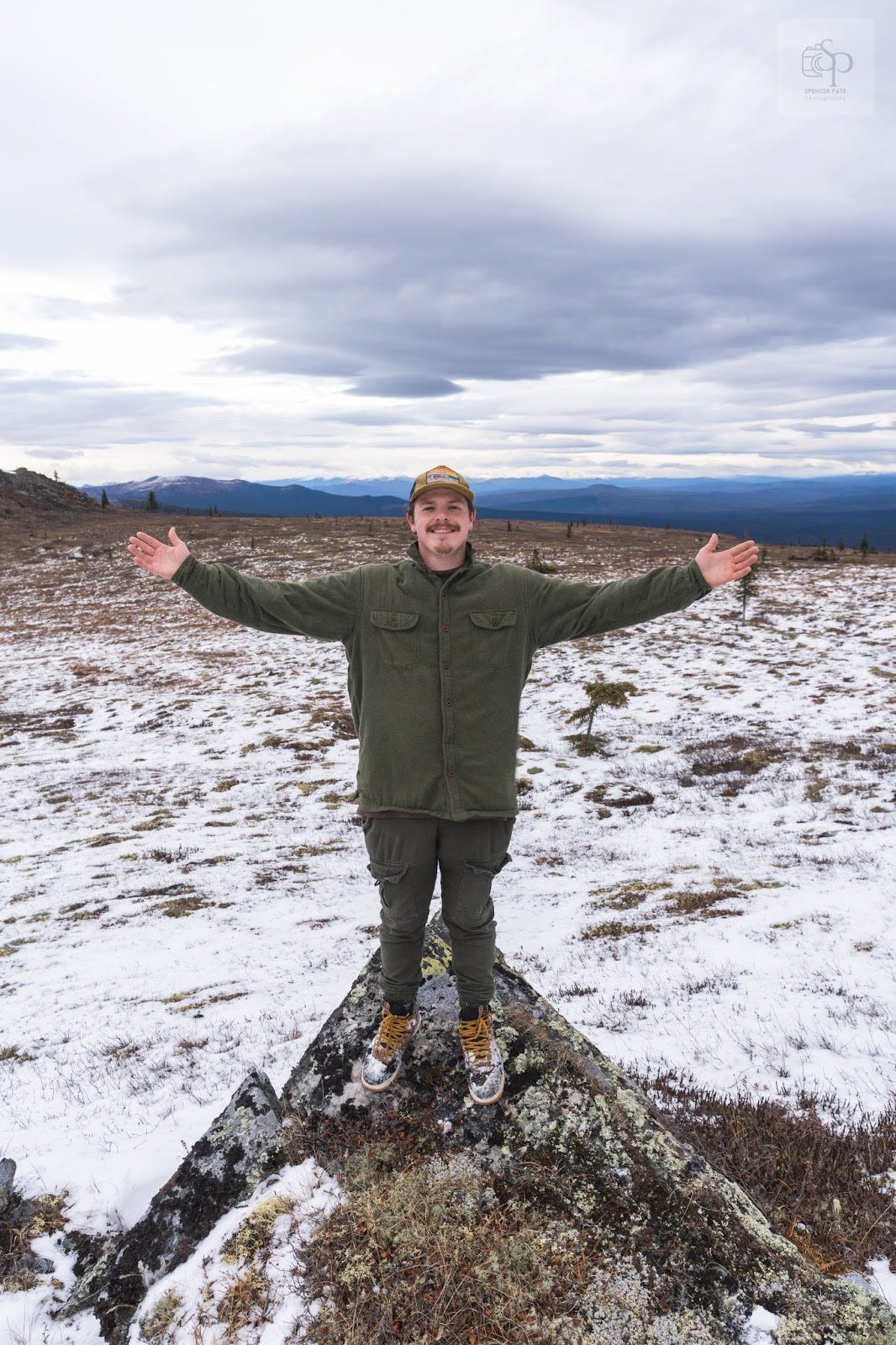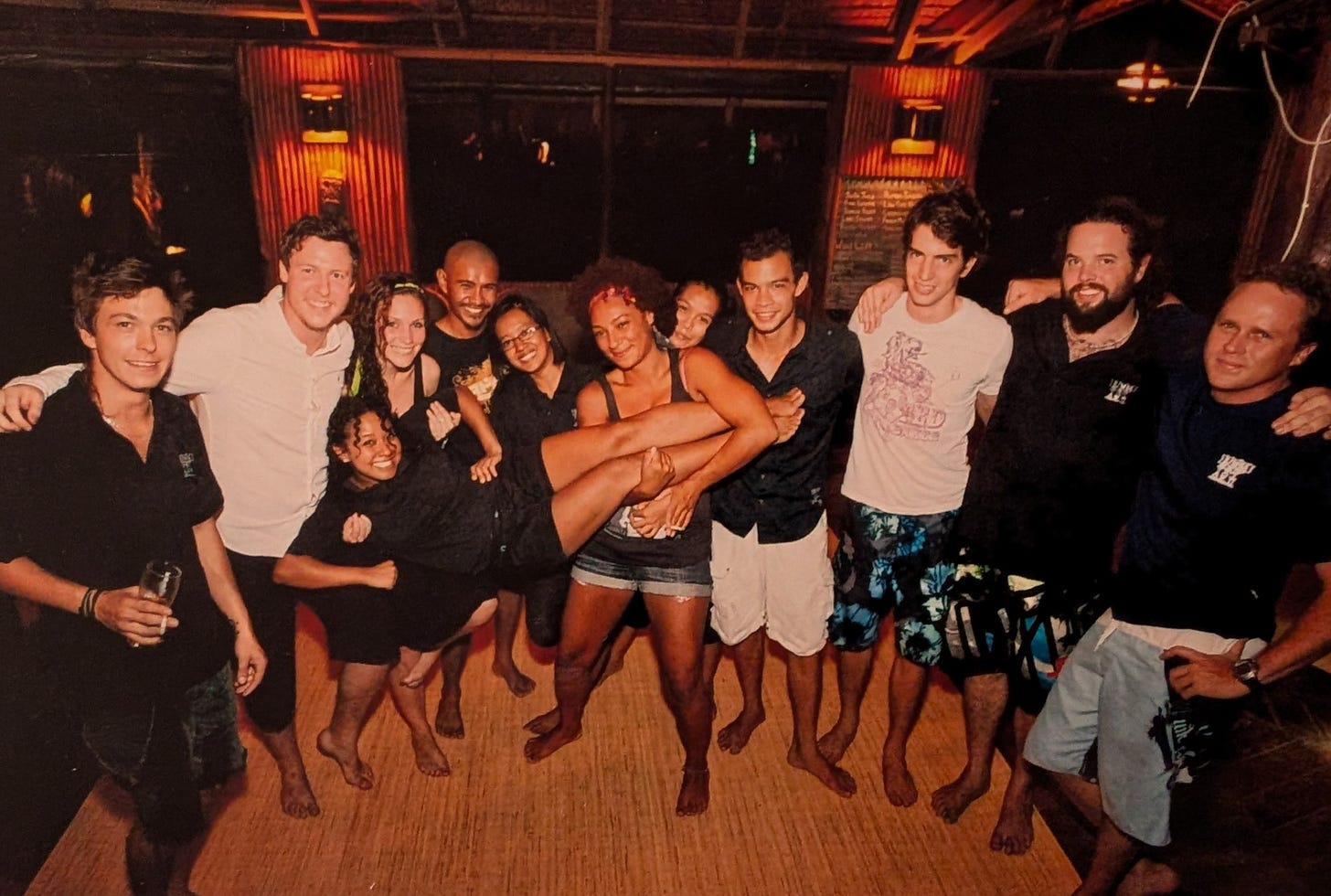Last month I traveled to Alaska for a 10-day vacation full of outdoor adventures. Apparently, early September is a fantastic time to explore Alaska because the leaves are starting to change color and the temperatures are cool but light layers are sufficient during the day reserving your warmest layers for only after the sun goes down. The first place that we visited on our trip was Fairbanks in hopes of catching the northern lights. I had reserved igloo-shaped accommodations at Borealis Basecamp about 40 minutes outside of the city, a place I learned about through suggested content on Instagram a few years ago. Not only were we lucky enough to see the northern lights all three nights of our stay, but we were also fortunate enough to get to know three of the staff members through the excursions. Their journeys to become activity guides in Alaska started in different geographic locations but were rooted in a shared curiosity and intrigue to visit this far corner of the world. This month I am spotlighting their stories in more of an interview format, and I hope that their words will spark something in all of us to live our childhood dreams and take chances.
Meet Dustin Powers (D). Dustin was our guide for a 6-hour UTV tour through the White Mountains. Going into his third season as an activity guide at Borealis Basecamp, he calls Missouri home. Before Alaska, he was a heavy machinery operator and bartender working 14-16 hour days, 6 days a week. From a young age Dustin dreamed of going to Alaska inspired by a book his dad owned called Alaska Wildlife. So after 3 years of working long hours at multiple jobs, he was ready to take his Grandpa's sage advice, "Don't live so you can work. Work so you can live." A colleague had told him that Alaska offers seasonal work opportunities, and soon he learned that seasonal work exists all around the world. Dustin experienced an epiphany once he discovered that traditional career paths weren't the only option. There are thousands of opportunities that the average person just doesn't know exist.
Dustin applied for a job at the Wilderness Lodge in Seward, where orcas come right up to the beach. The listing stated that the lodge would provide housing and food, so he applied as a bartender but the job turned out to be so much more. For the first 3 weeks, he was alone on an island doing the season-opening work like taking down panels from the snow and hooking up the water line. A lodge staff member met him on the island to show him what to do and then left him there. It was an unreal experience and he immediately fell in love with the location. Dustin's original plan was to go home after that first season but instead, he stayed and continued to work. He finally went home for a visit after a year and a half, and now 6 seasons later he is still here in Alaska for most of the year.
Photo Credit: Spencer Pate Photography
Meet Aiden Woolever (A). Aiden is embarking on his first season at Borealis Basecamp and is soaking up every minute of joy in this new role. Aiden joined us for the UTV tour as well in more of a training capacity as he gets up to speed on the various responsibilities that his job requires. He ventured out to Alaska from his home state of Utah in search of adventure: hiking, hunting, fishing, and outdoor activities. He also longed to go to Alaska from a young age, but knew when the time came he wanted to stay for a decent amount of time and thus would need to work. This is his first seasonal job anywhere and is excited to do stuff he enjoys while working.
"It all still feels like a dream. We learn things like WFR (Wilderness First Responder) which will only continue to open up more doors."
Meet Marina Levicka (M). Marina led our reindeer meet & greet excursion and is now in her second season at Borealis Basecamp. She was born in Atlanta but grew up in Slovakia. Following her high school graduation, Marina decided to volunteer in Africa. Volunteering is unpaid work. So once she had spent all her money, her dad informed her it was time to find a job. Led by her adventurous spirit and open mind, Marina chose to search for work in Alaska. Enticed by the remote environment and the beauty of nature, she managed to find a summer job that she loved so much it prompted her to search for a way to stay beyond the summer season. Borealis Basecamp is one of the few places to work during the winter season in Alaska, which allows her to stay in the state year-round.
"I've always dreamed of traveling long term and seasonal work allows you to do that while making money."
When asked to describe their job, they each surprisingly put less emphasis on the tasks to be done and moreso highlighted how they get to connect with people.
M: I would describe my job as so much fun. I work at a northern lights viewing company and get to take people out on snowmachines and UTVs to the Alaskan backcountry. I introduce them to reindeer, drive them in our Haglund military machine, and most importantly, I meet people from all over the world while doing this.
A: It's a very social job. You have to know how to talk to people correctly and stay calm. You talk to a lot of people in a day, so you have to remember your manners and be respectful. Treat them as your guests. They are coming to have a good time and you want to make that happen.
D: I want to be treated as a guest should when I'm on vacation and now I understand how hard people work to make that possible. This work shows me the other side. When I go on vacation now I know there is more to the story when something's not working properly.
A full season at the resort is 8 months (September through April). Keeping in mind that from November to January that part of the globe receives less than 8 hours of sunlight a day, I asked the crew what it's like during that time.
A: I haven't felt that yet. I know you have to actively challenge your mind and happy lights help. I’ve heard it’s also good to socialize more which is probably even harder after a full day of work when it gets dark quickly.
D: I used to be antisocial. When I first got here I kept to myself. I'd put my airpods in and zone out, but I've learned the importance of gaining close friends to get through it. I have personally seen people go crazy. It's about how active you are. You have to make sure to soak up that 4 hours of sunlight. You see people gravitate to different vices to mentally stabilize themselves. You watch people mentally go downhill very fast. You don't really realize how much it affects you until the sun comes back up, but I love it. It feels like a slow version of not getting enough sleep...except you sleep a lot more. The resort provides puzzles and mind-stimulating activities. They also recommend we take vitamins.
What do you love most about your job?
M: The connections you make with people. I thought I was an introvert until I became a guide and realized how much happier I am when I talk to people. It's been my favorite part of every day. The kind words that people tell me mean a lot. Also working outside is very good for my mental health. My job forces me to be outside more than I would on my own and even though it's hard sometimes, in the end, it's really amazing.
A: Meeting so many new people from around the world and learning about different cultures. Making close friends. The views. Everything is spectacular. I feel like I'm dreaming.
D: I just like exploring. Fulfilling my childish wish of exploring the world and doing things that people dream about. People go on vacation for this: snow machines in the White Mountains, dog mushing on a glacier, walking reindeer in the dead of winter, things you didn't think you'd ever be able to do and now it's your job to do it. Watching the different seasons come up as the leaves turn golden. The wonderland when it turns to winter. Spruce trees coated in shimmering glossy snow like trees in a Christmas store.
What is the most challenging part of your job?
M: Being outside in all the weather conditions. It's tough when it's 25 below and you're out there in a snowmachine, but again I'm glad I am basically forced to be out there. It made me toughen up.
The hardest part though is being away from my family. Being from Slovakia, they are very far away and I am homesick.
A: Also socializing. You can have a long day and you don't want to socialize even if it's the best thing for you. I can imagine that in the winter, the cold and darkness are probably the toughest parts.
D: The winter for me is not bad at all. The hardest part is being away from family. I recently got engaged and being apart for months at a time is hard, but we agreed to that. Some people see us in our jobs and think, "They must be having a blast," but that's not always the case. We are away from our families 9 months out of the year. It's rough but you gain a different family out of it. Aiden I met just 3 weeks ago and we are close now. We are also roommates. He knows more about me than most other people. In this environment, you get close quickly.
They have always treated me right here when things have come up in the past 3 years. They are less like a business and more like a family.
People ask, "Don't you want a real job?" and I just want to be able to make a sustainable living while also enjoying my life. 9 to 5 is comfortable for some people but I get stressed out if I am in one place for a long time. Seasonal work gives you the opportunity to move around. Teachers don't make much and that's a career. Some seasonal workers, like ski instructors, will make more than $20-$30/hour. It can be a way to pay off college. It's part of the tip industry so you can make up to $50-$60/hour or more.
What advice would you have for someone who is thinking about switching to seasonal work?
M: If you're in a spot where you feel a need for change or trying something new - do it! Find a place you want to go and there probably is a job opportunity for you. The website I use is coolworks.com. It's really life-changing, but it's not for everyone and that's okay. It still is so worth trying!
A: Just do it. It's worth the experience. Meet new people. Try new things. See new sights most people will never see. Maybe 10% of people in the world will ever get to see this. It's not for everybody but it's worth a shot.
D: Try it if you have a summer or a winter when you have nothing to do, but do your research on seasonal work, the state, and the job. Just because it says it's a great job doesn't mean it is. Look at Glassdoor and other review sites.
Also, remember, it's okay to quit. You won’t inconvenience the company. There are always more people lined up. You are replaceable. If it's mentally draining, leave. Find what makes you happy. It's seasonal for a reason. You don't have to stay in one place. And if you run out of states, there are always other countries to explore.
As someone who left the U.S. to work at an island resort in Malaysia for a season, I could not agree more. If adventure is calling, answer it. Maybe you won’t end up going but you owe it to yourself to at least explore the option.








